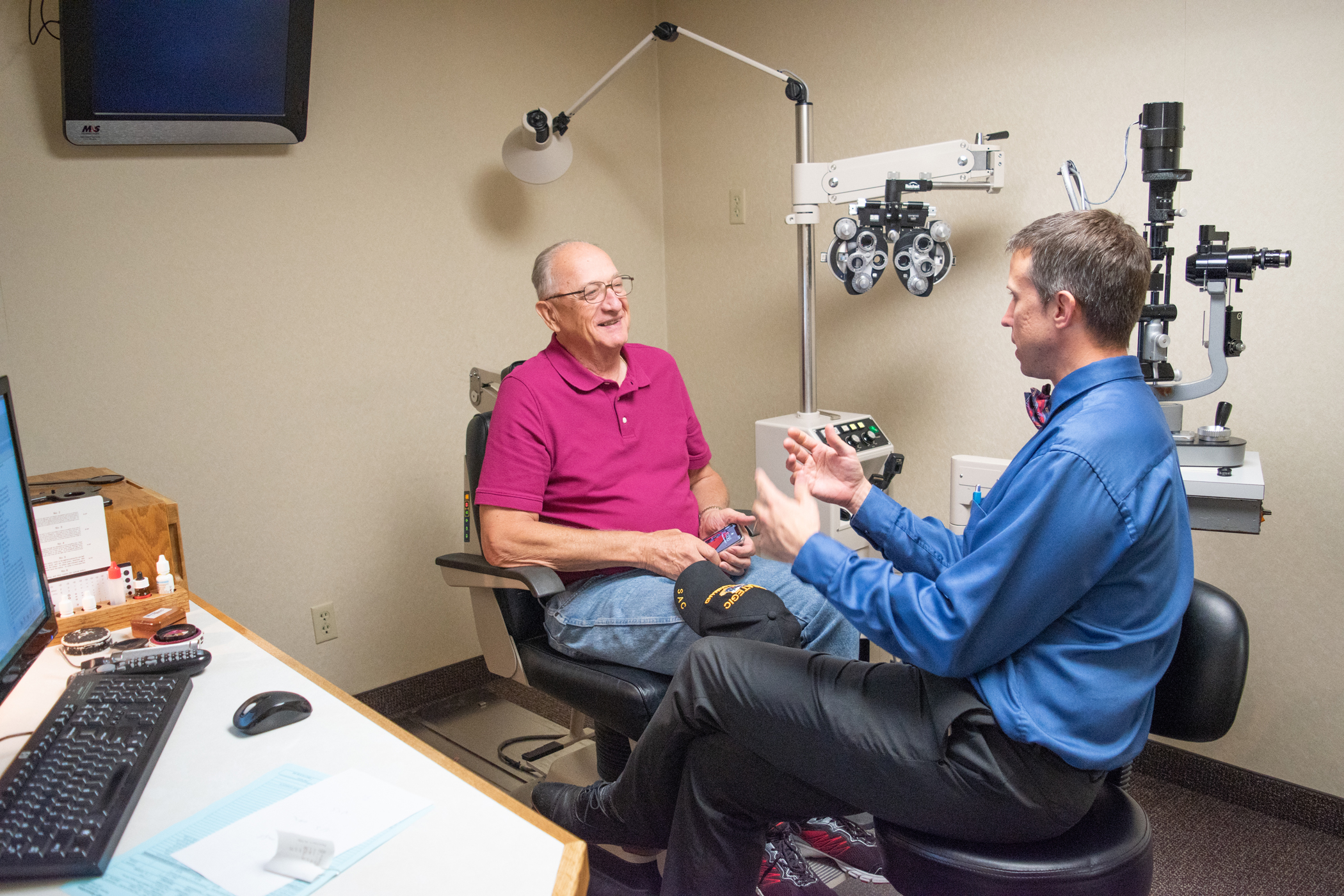Cataract Care & Surgery
Inside our eyes, we have a natural lens. The lens bends (refracts) light rays that come into the eye to help us see and should be clear. When a cataract develops, the lens has become cloudy and it is like looking through a foggy or dusty car windshield. Things can look blurry, hazy or less colorful with a cataract.
Aging is the most common cause for cataracts. This is due to normal eye changes that happen starting around age 40. That is when normal proteins in the lens start to break down. This is what causes the lens to get cloudy which is one of the common symptoms of cataracts. People over age 60 usually start to have some clouding of their lenses. However, vision problems may not happen until years later. Other reasons you may get cataracts could include having parents, brothers, sisters or other family members who have cataracts, having certain medical problems such as diabetes, having had an eye injury, eye surgery or radiation treatments on your upper body, having spent a lot of time in the sun especially without sunglasses that protect your eyes from damaging UV rays or using certain medications such as corticosteroids, which may cause early formation of cataracts.

Types of Cataracts
Subcapsular Cataract
A subcapsular cataract occurs at the back of the lens. People with diabetes or those taking high doses of steroid medications have a greater risk of developing a subcapsular cataract.
Nuclear Cataract
A nuclear cataract forms deep in the central zone of the lens. Nuclear cataracts usually are associated with aging.
Cortical Cataract
A cortical cataract is characterized by white, wedge-like opacities that start in the periphery of the lens and work their way to the center in a spoke-like fashion. This type of cataract occurs in the lens cortex, which is the part of the lens that surrounds the central nucleus.
Symptoms of Cataracts
At first, a cataract could have little effect on your vision. You may notice that your vision is blurred a little, similar to looking through a cloudy piece of glass. Or you may notice when you drive at night that the oncoming headlights cause more glare than before. Other symptoms of cataracts that you may notice include:
- Seeing double (when you see two images instead of one)
- Being extra sensitive to light
- Having trouble seeing well at night or needing more light when you read
- Seeing bright colors as faded or yellow
Cataract Treatment
Treating cataracts can only be done with cataract surgery. If your symptoms of cataract are not bothering you very much, you don’t have to remove a cataract. You might just need a new eyeglass prescription to help you see better. You should consider cataract surgery when symptoms of cataracts keep you from doing things you want or need to do.
During cataract surgery, the surgeon will remove your eye’s cloudy natural lens. Then he or she will replace it with an artificial lens. This new lens is called an intraocular lens implant (IOL). When you decide to have cataract surgery, your ophthalmologist will talk with you about an lens implants and how it work.
People who have had cataract surgery may have their vision become hazy again years later. This is usually because the eye’s capsule has become cloudy. The capsule is the part of your eye that holds the lens implants in place. Your ophthalmologist can use a laser to open the cloudy capsule and restore clear vision. This is called a capsulotomy.
Cataracts are a very common reason people lose vision, but they can be treated. You and your ophthalmologist should discuss your symptoms of cataracts. Together you can decide whether you are ready for cataract surgery.
Ophthalmology Associates is proud to offer the AcrySof IQ Vivity™ Lens, an innovative technology for cataract surgery patients. This lens is the first and only non-diffractive extended depth of focus intraocular lens implant for patients having cataract surgery in the United States. The lens corrects distance vision, reduces astigmatism and provides vision at an arm’s length while still providing some functional vision close up—helping patients engage in lifestyle activities and hobbies with more independence from glasses after cataract surgery. Contact Ophthalmology Associates to learn if AcrySof IQ Vivity™ Lens is a viable cataract treatment for you.
Having Trouble Seeing, Even with Your Glasses?
Take our Cataract Self Test
Convenient Eye Care
OUTREACH CLINICS
Our doctors do outreach care including exams and surgery. Check out our locations.
24-Hour Access
NEED EMERGENCY CARE?
Get connected with the on-call doctor using our Answering Service. If immediate care is needed, please call 911.
Meet Dr. Emily Birkholz
Dr. Birkholz specializes in cataract surgery, LASIK eye surgery, medical retina, glaucoma management and more.
Learn About LASIK
Our doctors have vast experience performing LASIK surgeries. We would be more than happy to provide further education on LASIK.
Special Financing Promos
We can help you get the vision care you want and need with CareCredit or Alphaeon convenient payment plans.
Request An Appointment
Ophthalmology Associates has been serving the greater Mankato area for over 50 years and our goal has been to provide our patients with the utmost in personal attention and the very best in eye care services. Contact us to set up your appointment today!
